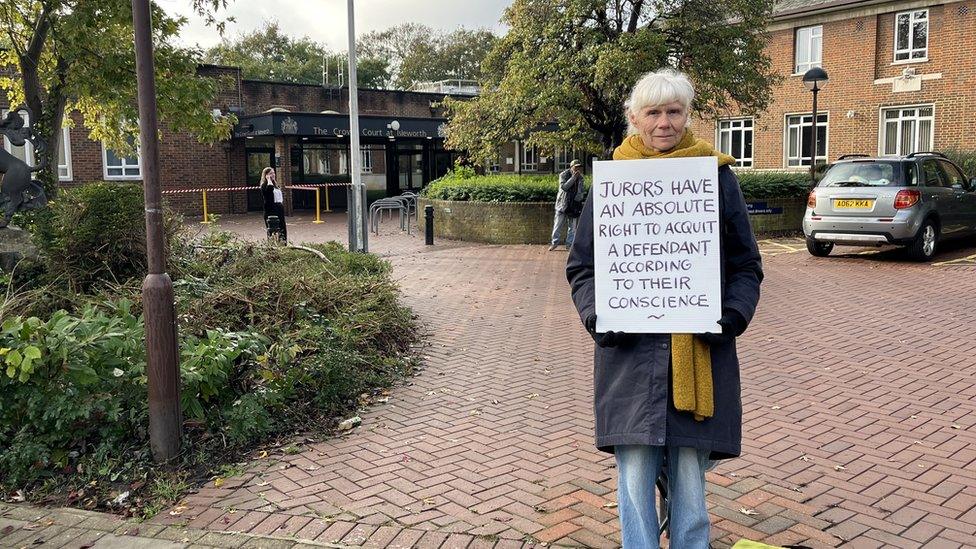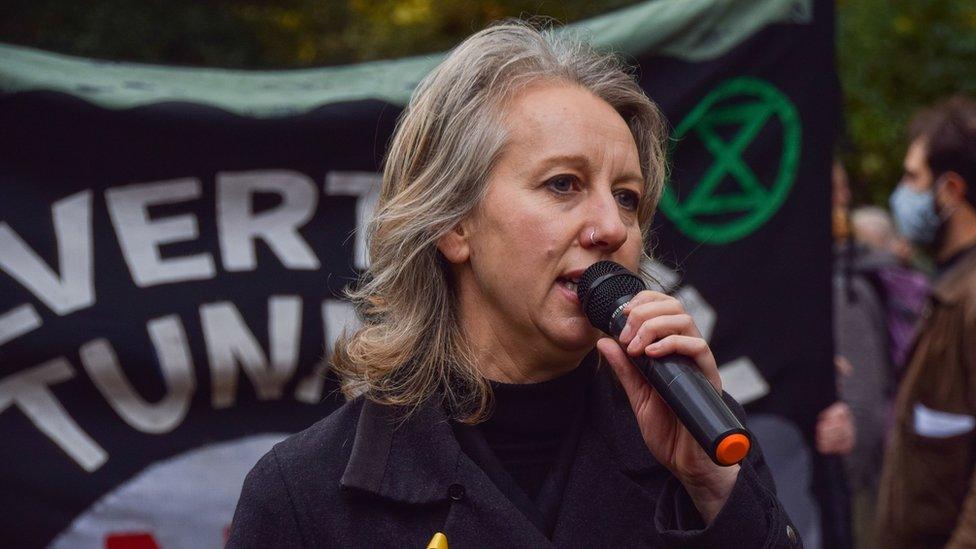XR founder convicted after four-year legal saga
- Published

Significant damage: Courts have ruled there are no human rights defences to such protests
The co-founder of Extinction Rebellion has been convicted of causing £27,500 of damage after a four-year legal saga over protest rights.
Gail Bradbrook was unanimously found guilty of criminal damage to the Department for Transport in 2019 after a three-day trial.
At one stage, the judge warned he could use anti-jury tampering powers amid rows over what she could tell jurors.
She said she was silenced by the court - and will be sentenced next month.
The Extinction Rebellion mass demonstrations movement staged two major protests in London in 2019 - leading to thousands of arrests and a policing bill running to ten of millions after parts of the city were brought to a halt.
During the second protest in October, Gail Bradbrook climbed onto an entrance canopy at the Department for Transport's headquarters.
She then used tools to break a large pane of reinforced security glass. The specialist glass cost £27,500 to replace because it had to meet specific security standards and had to be quickly replaced.
Bradbrook said she had specifically chosen to target the DfT because of the huge environmental damage that was being caused by the HS2 project.
During her police interview, she said she was trying to stop crimes against humanity and "had permission from nature" to break the window.
Delays and legal wrangles
The pandemic delayed her trial - and it was then put off amid a political row over the acquittal of protesters who had toppled the controversial Bristol statute of slave trader Edward Colston.

Protest: Gail Bradbrook on top of the government building's entrance
Following that case, the Court of Appeal ruled that the right to protest under human rights law could not be used to avoid conviction for violent demonstrations that cause significant damage.
During the preparations for Gail Bradbrook's trial in July this year, the former scientist, who did not have a lawyer, said she intended to tell jurors that she could not be found guilty because of her right to freedom of expression and that she was also trying to prevent a greater crime of climate destruction.
'Jury tampering'
She also argued that breaking the glass had been legally necessary and it was possible that government officials may have consented had they known why she was doing it.
Judge Martin Edmunds KC ruled none of these arguments were valid legal defences that a jury could consider - but Dr Bradbrook then repeatedly tried to turn to them in her evidence, arguing that she was otherwise being silenced.
The judge stopped the hearing and gave a rare warning that he may have to decide the case alone under seldom-used powers originally drawn up to prevent gangsters influencing juries.
"It is evident that Dr Bradbrook, by reference to her beliefs, considers either that the rules that apply to every other criminal defendant do not apply to her or that she is entitled to disregard them," said the judge in his July ruling.
"Dr Bradbrook gave every appearance of seeking to engineer a situation where I was obliged to curtail her evidence in front of the jury and/or to commence contempt proceedings.
"The Crown [Prosecution Service] have given notice that, if there was an attempt at what they consider to be jury tampering, they may well make application... to seek a discharge of the jury and to seek a trial continued by judge alone."
Gail Bradbrook's trial was rescheduled for October - and she was banned again from reading out a 75-page on her beliefs and justifications for breaking the glass.
This time, when she began to tell the jury her reasoning, Judge Edmunds chose not to halt the trial - but instead intervened 15 times to stop her from breaching his ruling on admissible evidence.

Supporters stood outside the court during the trial
"I admit I broke the window," she said. "I intended to break the window. None of this is in dispute. I maintain I am not a criminal.
"I believed that I had a defence in law. The powers that be don't like it when people like me are acquitted and have made it more difficult."
Judge Edmunds told her that the law had not been changed since she had been charged.
"You are clear about my rulings?" he asked. "This is a trial about criminal damage. It is not and can never be a platform for your general views which you are welcome to share elsewhere."
"I have a defence as a mother," she replied at one point.
"We operate on the basis of rules of relevance and inadmissibility," said the judge.
Bradbrook replied: "To quote Gandhi, 'I have disregarded the order in obedience to the higher law of our being, the voice of conscience'."
Jury signs outside court
During the three days of the trial, supporters sat outside the court holding placards telling jurors they had a right to acquit according to their conscience.
One demonstrator is currently facing a Contempt of Court hearing over a previous identical incident at another trial.
Gail Bradbrook will be sentenced on 18 December. The judge said that the starting point was 18 months in jail - but a suspended sentence was an option.
The XR founder has been separately convicted of breaking the window of a bank - a case that was been dealt with as a less serious matter.
Earlier this week, a separate trial of eight environmental protesters who were accused of damaging the Treasury by spraying it with fake blood ended in acquittals.
Related topics
- Published20 December 2022

